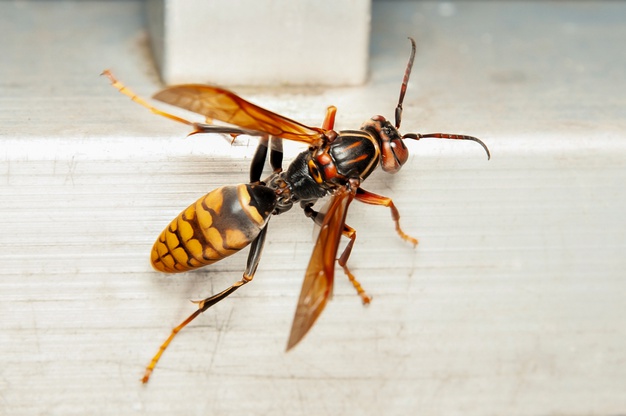Asian giant hornet can also be called the Giant Sparrow Bee. It is the biggest species of hornet in the world. It is usually found in Eastern Asia. Asian giant hornets reside in temperate and tropical forests. It is incredibly varied in the peaks of Japan.
Asian giant hornet is bold, and preying insect that, despite its harsh nature, cannot cope with the accelerated abode damage, which is the major danger for the survival of this category in the wild.
Asian giant hornet Facts:
Formation of the nest comes in the spring and proceeds until the autumn when workers and queens complete their life cycle and die.
Whir flies away from the colony when they attain the adult stage. They expire as soon as they fertilize newly-formed queens.
Fertilized queens remain dormant until the spring when the cycle starts all over again.
Asian giant hornet is part of the human diet in Japan.
Asian giant hornet is prone to 40 human deaths in Japan each year.
Asian giant hornets can attain 1.5 to 2 inches in length. It possesses a wingspan of 3 inches.
Asian giant hornet possesses an orange head with brown antennae. The abdomen is coated with alternate dark-brown and yellowish-orange bands.

Asian giant hornet does not stop attacking humans. All sufferers should pursue medical attention as soon as possible due to life-threatening allergic reactions.
One Asian giant hornet can slay 40 honey bees in less than a minute, while few of them can destroy a colony of 30.000 honey bees after only a couple of hours.
A swarm of honey bees surround the Asian giant hornet and the temperature around it rises until it “ripens”. These surrounding bees increase the temperature to 46 degree c , to kill the hornet but not kill themselves.
But not all bees can defend themselves from Hornet they might be able to kill 1-2 in groups but ultimately hornets win.
More Facts:
Vespa mandarinia is also known as Asian Gaint Hornet.
Hornet larvae are carnivorous, they feed on insects but they are fed by giant hornets.
Vespa Luctuosa in Japan has the most toxic venom ever recorded.
Normal people should not worry about encountering gaint hornets as they live in Forests and people don’t need to fear about it.





Leave a Reply